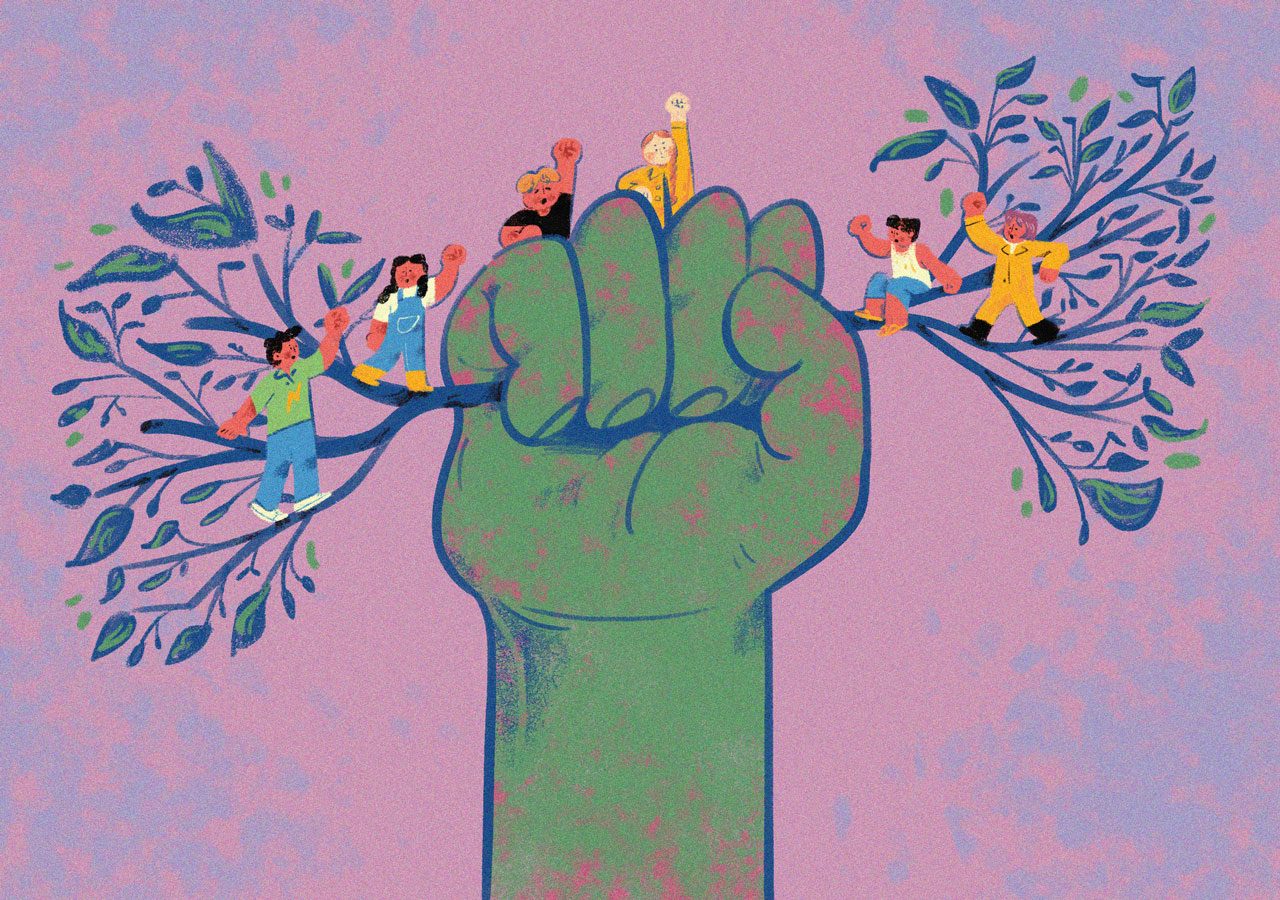Ahead of the upcoming United Nations Climate Change Gathering, which will take place in Egypt in November, Vijay Prashad describes how governments can shoulder their “common but differentiated responsibilities” to avert catastrophe
In November, most UN member states will gather in the Egyptian resort town of Sharm El Sheikh for the annual UN Climate Change Conference.
This is the 27th Conference of Parties to review the United Nations Framework Convention on Climate Change, commonly referred to as COP27. The international treaty on the environment was established in Rio de Janeiro in 1992, the first conference being held in Berlin in 1995; the agreements were extended in the 2005 Kyoto Protocol and complemented by the 2015 Paris Agreement.
No need to say more about the climatic catastrophe, which threatens the mass extinction of species. Moving away from carbon-based fuels has been blocked by three main obstacles:
Right-wing forces that deny the existence of climate change.
Sections of the energy industry that have a vested interest in the pursuit of carbon-based fuels.
Refusal of Western countries to admit that they remain primarily responsible for the problem and to commit to repaying their climate debt by financing the energy transition of developing countries from which they continue to siphon off the wealth.
In public debates about climate catastrophe, there is virtually no reference to the 1992 Rio Earth Summit and the treaty which noted:
“The global nature of climate change calls for the widest possible cooperation of all countries and their participation in an effective and appropriate international response, in accordance with their common but differentiated responsibilities, their respective capacities and their social and economic conditions.”
The phrase “common but differentiated responsibilities” is a recognition that while the problem of climate change is common to all countries and none are immune from its deleterious impact, the responsibility of countries is not not identical. Some countries – which have benefited from colonialism and carbon fuel for centuries – have a greater responsibility in the transition to a decarbonized energy system.
The doctrine on the matter is clear: Western countries have benefited enormously from both colonialism and carbon fuel to reach their level of development. Data from the Global Carbon Project, which was run by the US Department of Energy’s defunct Carbon Dioxide Information Analysis Center, shows that the United States is by far the largest producer of carbon dioxide emissions. of carbon since 1750.
The United States alone emitted more CO2 than the whole of the European Union, twice as much as China and eight times as much as India. The main carbon emitters were all the colonial powers, namely the United States, Europe, Canada and Australia, which, despite accounting for about a tenth of the world’s population, together accounted for more than half of the cumulative global emissions.
Since the 18th century, these countries have not only released most of the carbon into the atmosphere, but they continue to exceed their share of the global carbon budget.
Carbon capitalism, enriched with the wealth stolen by colonialism, has enabled the countries of Europe and North America to improve the well-being of their populations and to reach their relatively advanced level of development. The extreme inequalities between the standard of living of the average European (748 million people) and the average Indian (1.4 billion people) are seven times greater than a century ago.
Although China, India and other developing countries’ dependence on carbon, particularly coal, has reached a high level, their per capita emissions are still well below those of the United States. , where per capita emissions are nearly double those of the United States. of China and eight times that of India.
Lack of recognition of climate imperialism leads to a lack of resources for the Green Climate Fund, which was established in 2010 at COP 16 with the aim of helping developing countries “leapfrog” development social fueled by carbon.
Globally, debates on how to address the climate crisis frequently revolve around various forms of Green New Deal (GND), such as the European Green Deal, North American GND and Global GND, which are promoted by nation states, international organizations and different sections of environmental movements.
In order to better understand and strengthen this discussion, the Tricontinental office of the Institute for Social Research in Buenos Aires, Argentina, brought together leading eco-socialist scholars to reflect on the different GNDs and the possibilities of achieving real transformation. to avoid climate catastrophe. .
This discussion – with José Seoane (Argentina), Thea Riofrancos (United States) and Sabrina Fernandes (Brazil) – is now available in Notebook n° 3 (August 2022), “The socio-environmental crisis in times of pandemic: discussing of a green crisis New deal.’
These three scholars argue that capitalism cannot solve the climate crisis since capitalism is the main cause of the crisis.
One hundred of the world’s largest companies are responsible for 71% of the world’s industrial greenhouse gases (mainly carbon dioxide and methane); these companies, led by the carbon energy industry, are not ready to accelerate the energy transition, despite the technological capacity to generate 18 times the world’s electricity demand from wind energy alone.
Sustainability, a word that has been stripped of its content in many public discourses, is not profitable for these companies. A social renewable energy project, for example, would not produce huge profits for fossil fuel companies. The interest of some corporate capitalists in the Green New Deal is essentially driven by their desire to obtain public funds to create new private monopolies for the same capitalist class that owns those big corporations that are polluting the world.
But, as Riofrancos explains in the notebook, “green capitalism” claims to alleviate the symptoms of capitalism – global warming, mass extinction of species, destruction of ecosystems – without transforming the model of accumulation and consumption that caused the climate crisis in the first place. It’s a ‘techno-fix’: the fantasy of changing everything without changing anything.
The mainstream discussion of GND emerges, as Seoane points out, from initiatives such as the 1989 Pearce report “Blueprint for a Green Economy”, which was prepared for the UK government and proposed the use of public funds to produce new technologies for private companies as a solution to the cascading crises of Western economies.
The concept of the “green economy” was not to green the economy, but to use the idea of environmentalism to revitalize capitalism.
In 2009, during the global financial crisis, Edward Barbier, co-author of the Pearce report, authored a new report for the United Nations Environment Program entitled “Global Green New Deal”, which repackaged the ideas of ” green economy’ as ‘green new business.’ This new report makes the case once again for public funds to stabilize the turbulence of the capitalist system.
Our notebook emerges from a different genealogy, one rooted in the Peoples’ World Conference on Climate Change and the Rights of Mother Earth (2010) and the Peoples’ World Conference on Climate Change and the Defense of Life ( 2015), both held in Tiquipaya, Bolivia, and later expanded into gatherings such as the Alternative World Water Forum (2018), People’s Summit (2017) and People’s Forum for Nature (2020).
At the heart of this approach, stemming from popular struggles in Latin America, are the concepts buen vivir and teko porã (“living well”). Rather than simply saving capitalism, which is the subject of the GND argument, the interest of our notebook is to think about changing the way we organize society, in other words, to advance our thinking on the construction of a new system.
Building these ideas, says Fernandes, must involve trade unions (many of whom are concerned about the loss of jobs in the transition from carbon to renewables) and peasant unions (many of whom are gripped by the fact that land concentration destroys nature and creates social inequalities).
We need to change the system, as Fernandes argues, “but the current political conditions are not conducive to that. The right is strong in many countries, as is climate science denial. Therefore, quickly, the popular movements must put on the table a decarbonization agenda. Four objectives await us:
Decline for Western countries. With less than 5% of the world’s population, the United States consumes a third of the world’s paper, a quarter of the world’s oil, nearly a quarter of the world’s coal and a quarter of its aluminum. The Sierra Club says US per capita consumption “of energy, metals, minerals, forest products, fish, grain, meat, and even fresh water dwarfs that of people living in the developing world” . Western countries must reduce their overall consumption, reducing, as Jason Hickel notes, the “unnecessary and destructive” (such as the fossil fuel and weapons industries, the production of McMansions and private jets, the mode of industrial beef production and the whole corporate philosophy of planned obsolescence).
Socialize the key sector of energy production. End subsidies to the fossil fuel industry and build a public energy sector anchored in a decarbonized energy system.
Fund the Global Climate Action Program. Ensure that Western countries assume their historical responsibilities by supporting the Green Climate Fund, which will be used in particular to finance the just transition in the countries of the South.
Strengthen the public sector. Build more infrastructure for social rather than private consumption, such as more high-speed trains and electric buses, to reduce the use of private cars. The countries of the South will have to build their own economy, in particular by exploiting their resources. The question here is not entirely whether these resources should be exploited, but whether they can be extracted for social and national development and not simply for capital accumulation. Buen vivir — living well — means transcending hunger and poverty, illiteracy and ill health, which will be developed by the public sector.
No climate policy can be universal. Those who devour the world’s resources must reduce their consumption. Two billion people do not have access to drinking water, while half of the world’s population does not have access to adequate health care. Their social development must be guaranteed, but this development must be built on a sustainable and socialist basis.
ConsortiumNews.com, September 8. Vijay Prashad is an Indian historian, editor and journalist. He is editor and chief correspondent at Globetrotter. He is editor of LeftWord Books and director of Tricontinental: Institute for Social Research.












